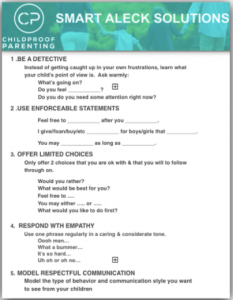The smile that lights up your day; that laugh that warms you up with joy and optimism; the ability to show you the world through innocent eyes: kids can be such amazing parts of our lives with their constant ability to learn and grow, teaching us how to see the big picture and to love someone so much it hurts.
And then they learn the word “No.”
It can be a shock to the system when your little angel, who so recently curled up on your lap and thought you were the coolest thing on the planet, suddenly starts rolling their eyes at your requests or talks back with sarcastic comments. How did they learn that kind of sass? What makes them think they can get away with being a smart aleck? The nerve!
This type of behavior is absolutely normal and developmentally appropriate. When they’re being sassy, there’s usually something underneath that, driving that behavior. Kids often use this kind of talk to feel powerful, so it’s a clear indicator that your child is feeling powerless.
Sure, snarky communication is a normal developmental process for kids, but it doesn’t make it easier to swallow. How quickly those warm fuzzy feelings you had about your child can be tainted with annoyance, frustration, and anger. So it is important that we look underneath the surface so we can determine what is driving the behavior so we can determine the best way to respond.
Five Solutions for Sassy Back Talk
-
Be a detective.
First, identify how you feel. Ask yourself, “What is this bringing up for me right now?” If you feel an overwhelming sense of anger, acknowledge it, but don’t let it dictate your discussion. Or if you feel the impulse to “be the boss,” it’s a good indicator that you feel like you’re losing control. This is a good time to take a breath and look at the bigger picture.
Then, assess how your child feels.
Many parents fall into knee-jerk reactions to what their child is doing rather than why their child is doing and thus the behavior continues.
Instead of getting caught up in your own frustrations, learn what your child’s point of view is. Ask warmly, “What’s going on, honey?” or for younger kids, closed-ended questions like, “Do you feel frustrated?” “Do you feel like you’ve been bossed around all day, or do you need some attention right now?”
Most importantly, don’t tell your child how they feel—it’s not helpful and can lead to more resistance.
-
Respond with empathy.
Kids don’t make the choice, ‘I’m going to be a smart aleck right now to see what happens’—that behavior is driven by their needs and emotions. They’re just being reactive to their emotional state without knowing why.
So once you uncover those needs and emotions, respond to them with warmth and understanding, while setting clear expectations for behavior. This might sound something like, “Wow, you sound really frustrated that you cannot have your ice cream before dinner. It’s okay to feel frustrated, but it’s not okay to roll your eyes and talk to me like that.”
Then you can compassionately engage your child in problem-solving and finding other ways to get their needs met. If your child is acting out with snotty remarks, and you’ve determined they just need your attention, offer them alternatives. “Remember when I was on the phone yesterday and you asked me to play Legos with you? What was that thing you said that worked so well?” or “What’s another way you can get my attention?” or even, “You know, when I was a kid, here’s what I did to get my dad’s attention, and it worked!”
-
Use enforceable statements.
Have you ever been out to eat and your child made a scene? If you’re like most parents, you may have gone immediately for the big guns: “If you don’t cut it out, we’re going home.”
Did they cut it out? Likely not. Did you go home? Likely not.
Coming right out of the gate with a threat doesn’t always work with children because it doesn’t address their need behind the misbehavior. It just tells them they need to behave in a different way, and their needs may never get met. Not a fun prospect, is it?
And worse, if you don’t follow through, your child will learn you don’t actually mean what you say, and they will continue to test your boundaries.
Enforceable Statements are simply you respectfully stating what you’re willing to do or allow. That way if your child continues to be a smart aleck, they learn this is not an effective way of getting a parent to do what you want them to do.
This may sound something like, “I’m happy to talk with you when you stop rolling your eyes,” or, “I’m here for you, and we can talk more when your tone of voice sounds more like mine.”
-
Give limited choices.
Giving kids some control can help to avoid those misbehaviors in the first place. One way of sharing control with children is by offering limited choices. Some examples might sound like: “You need to clean your room now: do you want to start with the puzzle or with the stuffed animals?” or “Do you want me to help you clean up, or do you want to do it by yourself?” or “Do you want listen to music or sing the clean up song while putting toys away?”
These may sound like trifles to an adult, but to a young child who has little to no control over their lives it can make a huge difference in their sense of autonomy and freedom.
Of course, don’t offer options you’re not willing to follow through on. Remember the restaurant example? If you say, “Either shape up right now or we’re going home,” then you better leave if they don’t change their behavior. Be calm, firm and offer limited choices as often as you can.
-
Model respectful communication.
Most of all, walk your talk. If your child hears you respond to your partner with sarcasm and snark, or even hears you speaking ill of a cashier after you’ve already left the store, they will learn that it’s situationally acceptable to be snarky.
It’s unrealistic to have expectations that your child will be respectful and polite if you are not respectful and polite. Nothing will corrode your credibility faster than when you try to demand respectful communication from them. “But you roll your eyes at Dad all the time! Why is it so bad when I grumble at you?”
Be sure you’re modelling the type of behavior and communication style you want to see from your children. Feeling resentful toward your partner? Talk about it with them earnestly, without a snotty tone. Had a hard day at work? Avoid badmouthing your boss while your kids are in earshot.
It may not come naturally at first, but putting effort into understanding and directing your children’s communication will certainly nurture your relationship with them, their development and relationships. And as much as you can, don’t take the scoffs and eye-rolls personally.

Need a cheat sheet to remember all this? Click here.
[irp posts=”2673″ name=”Helping Kids Navigate Playground Politics (by Melissa Benaroya)”]
About the Author: Melissa Benaroya
 Melissa Benaroya, LICSW, is a Seattle-based parent coach, speaker and author in the Seattle area (MelissaBenaroya.com). She created the Childproof Parenting online course and is the co-founder of GROW Parenting and Mommy Matters. Melissa provides parents with the tools and support they need to raise healthy children and find more joy in parenting. Melissa offers parent coaching and classes and frequently speaks at area schools and businesses. Check out Melissa’s blog for more great tips on common parenting issues and Facebook for the latest news in parent education!
Melissa Benaroya, LICSW, is a Seattle-based parent coach, speaker and author in the Seattle area (MelissaBenaroya.com). She created the Childproof Parenting online course and is the co-founder of GROW Parenting and Mommy Matters. Melissa provides parents with the tools and support they need to raise healthy children and find more joy in parenting. Melissa offers parent coaching and classes and frequently speaks at area schools and businesses. Check out Melissa’s blog for more great tips on common parenting issues and Facebook for the latest news in parent education!



Leave a Reply